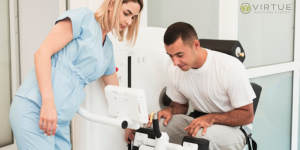Key Takeaways
- Dual diagnosis treatment addresses alcohol use disorder and mental health problems at the same time.
- Taking medications and undergoing therapy prevent relapses and help you remain sober for longer.
- Phoenix, Mesa, Tempe, Scottsdale local treatment programs focus on the community’s individual needs.
- With therapy, coping, and structured care, they can learn to build healthier futures.
- Tackling the two problems together can provide hope, stability, and improved quality of life.
Introduction
It’s rare for alcohol dependence treatment to be simple. Although detox + therapy is the missing link for nearly all, the majority of people who come to treatment are also handshaking with depression, anxiety, PTSD, or another mental health issue. Dual diagnosis is actually more common than most people think.
For people throughout Phoenix, Tempe, Scottsdale, and Mesa, a local alcohol rehab program that offers comprehensive care can make all the difference. In the past, mental health services and addiction treatment were frequently siloed from each other. A person going to rehab for alcohol could have been referred elsewhere during the pandemic for therapy or psychiatric treatment, leaving voids that spiked relapse odds. Today’s research underscores the importance of treating both together in order to ensure a sustained recovery.
Why Is Dual Diagnosis Care So Important in Local Rehab Settings?
How Common Is Dual Diagnosis Among People With Alcohol Addiction?
The relationship between alcohol abuse and mental health issues is no secret. Studies released by the National Institutes of Health state that few people with a problem of substance abuse do not also suffer from another mental disorder. The reasons are myriad; some use the bottle as a form of self-medication, others have mental health diseases as a product of heavy drinking.
Extended periods of alcohol consumption can disturb the brain’s chemical balance, causing mood swings, sleep problems, or problems with thinking. Meanwhile, those who are already dealing with conditions like depression may drink to numb their feelings, setting up a cycle that can be difficult to break, Ross says. This overlap just helps highlight why recovery must be shaped around dual diagnosis care.
What Challenges Do People Face Without Integrated Care?
When alcohol treatment overlooks mental health, the people who need help remain exposed. Take someone checking into local alcohol rehab for alcoholism who is also dealing with undiagnosed post-traumatic stress disorder (PTSD). For instance, if the rehab program only focuses on drinking, the individual might successfully complete detox but still have flashbacks, anxiety or insomnia. These unaddressed problems are ripe for rapid relapse.
Moreover, many experience difficulty with managing social pressure and triggers during their recovery. Challenging environments, toxic relationships, or unprocessed trauma regularly shove people back to alcohol if they don’t have coping skills. Integrated treatment is tailor-made to directly address these fears, and to offer people tools for managing both cravings and emotional difficulties as they arise.
How Do Local Alcohol Rehab Programs Provide Dual Diagnosis Support?

One of the local alcohol rehab facility’s biggest strengths is its availability. People can remain connected to family and community resources while receiving specialty care law. This kind of support is often crucial to keep up one´s motivation.
Local integrated programs for dual-diagnosis are typically a mixture of:
- Therapy: Techniques such as cognitive behavioral therapy (CBT) and dialectical behavior therapy (DBT) help to pinpoint unhealthy thought patterns and replace them with more constructive coping strategies.
- Medications: For depression and anxiety, certain medications can be used to rebalance and stabilize the brain.
- Group counseling: Sharing experiences with others who understand what you are going through helps you feel a sense of belonging and reduces isolation.
- Holistic treatment: Practices like mindfulness, exercise, or art therapy can help patients emotionally heal in addition to medical care.
The aim is a seamless plan in which addiction specialists and mental health professionals work together, and no part of treatment falls through the cracks.
What Role Does an Inpatient Rehab Center Play in Dual Diagnosis Care?

Although outpatient programs grant more flexibility, an inpatient rehab center can give the structure needed for individuals with severe dual diagnosis issues. And living in a sheltered environment to step away from triggers while forging new habits. Daily schedules generally consist of therapy sessions, medical check-ins, support groups, and various skill-building exercises.
This intensive approach for many helps to eliminate the cycle of relapse for your daughter, because they are constantly being supported and held accountable. It also affords the time and space to allow psychiatric symptoms to stabilize before being thrust back into the whirlwind of daily life.
How Does Dual Diagnosis Care Improve Long-Term Recovery?
A lasting recovery requires more than simply not drinking. It demands the kind of large-scale action that dismantles the conditions that give rise to addiction and constructs healthier methods of coping with life’s stresses. That’s where dual diagnosis treatment comes in.
- Those who work through addiction and mental health issues simultaneously achieve the following:
- Skills for emotional regulation to process stress, anger, or sadness.
- Relapse prevention cues are specific to their triggers.
- Better relationships as communication and understanding rise.
- Improved general wellness via a combination of sleep, nutrition, and stress management.
Equally important is preparation. It can be daunting to begin treatment, especially for those facing mental health and addiction together. Teaching how to mentally prepare for rehab can help to smooth this transition. Whether it’s by journaling, sharing with family and friends, or setting personal goals, preparation provides confidence and fortitude.
Better still, integrated treatment does not simply enable people to give up drinking, but assists them to create meaningful, purposeful lives free from the tyranny of alcohol.
Conclusion
Dual diagnosis treatment is essential for individuals struggling with alcohol addiction and mental health disorders. Integrated Care in Local Alcohol Rehab Treatment. An integrated care rehab setting treats the person and not the addiction symptoms. Through a combination of therapy, medical assistance, and coping skills, these programs establish a base for long-term stability.
Healing isn’t done alone. With expert help and sensitive care, recovery is achievable. To find out how dual diagnosis therapy can support long-term recovery, call Virtue Recovery Houston at 713-234-6254 .
FAQs
What is dual diagnosis in alcohol rehab?
Dual diagnosis is the treatment of alcohol use disorder and a comorbid diagnosis, such as anxiety, depression, or PTSD.
Is it possible that alcoholism is going to worsen my mental health symptoms?
Yes. Alcohol alters brain chemistry and can exacerbate depression, anxiety, or mood swings. It also compromises the efficacy of prescribed drugs.
Is medication an essential component of dual diagnosis treatment?
Not always. Some people are helped by medication; many others lean more on therapy, coping mechanisms, and changes to their lifestyle. Treatment plans are personalized.
Why Opt for Local Rehab for Dual Diagnosis Treatment?
Residential Rehab Recovery in an area like home includes being close to relatives, a normal living environment, and local members and local empowerment, which can lead to better participation and a long-term healthy life.
How long is dual diagnosis treatment?
The duration of the process depends on personal requirements, the depth of the addiction, and the presence of mental health problems. Others are in need of brief, but intensive therapy, whereas still others will receive long-term assistance.
Resources
- Integrated Treatment for Co-Occurring Disorders (National Library of Medicine, 2015). Available at: https://pmc.ncbi.nlm.nih.gov/articles/PMC4417038/
- Alcohol Use Disorder and Co-Occurring Mental Health Conditions (National Library of Medicine, 2023). Available at: https://pmc.ncbi.nlm.nih.gov/articles/PMC10157410/
- Integrated Dual Disorder Treatment (IDDT), Case Western Reserve University. Available at: https://case.edu/socialwork/centerforebp/practices/substance-abuse-mental-illness/integrated-dual-disorder-treatment








